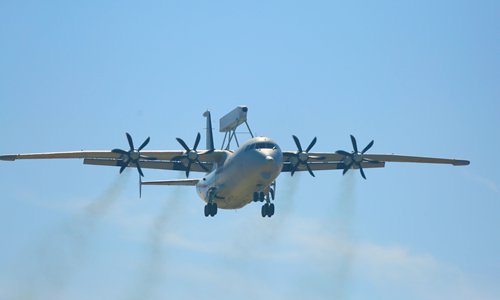


A KJ-200 airborne early warning (AEW) aircraft attached to a Navy aviation regiment under the PLA Northern Theater Command soars over the sky of Jiaodong Peninsula, east China's Shandong province during an air patrol mission in the 2018 Spring Festival holiday. Photo:eng.chinamil.com.cn
Future airborne early warning (AEW) aircraft could become unmanned, interconnected and highly intelligent, and will no longer need the traditional mounted radome, giving their greater aerodynamic and stealth capabilities, said China's top radar firm. Chinese military observers said on Wednesday that China is likely developing such aircraft.
In an article introducing AEW system aircraft written by the 14th Research Institute of China Electronics Technology Group Corporation (CETC) and posted on its public WeChat account on Tuesday, the company not only gave an overview on the history and facts of AEW carrying aircraft around the world, but also shared its vision on how this type of warplane could develop in the future.
Future AEW aircraft will become conformal, meaning antennas and sensors will be integrated into the aircraft's fuselage, the article said, noting that this will contribute to the warplane's aerodynamic and stealth capabilities and allow it to carry larger payloads.
AEW system aircraft usually have a radome -- where antennas and sensors are stored -- mounted on top of its fuselage. A military expert who asked not to be named told the Global Times that this structure results in extra air drag and reflects more radar waves, making the aircraft cumbersome and easy to detect.
Future AEW aircraft will be more interconnected to a combat network, making it capable of receiving data from land, sea, air and space-based platforms, which can then provide support to combatants, according to the CETC article.
The article gave this example: A fighter jet could use target information received from AEW aircraft to deliver a strike without using its own radar, which could be suppressed in electronic warfare or intentionally shut down to maintain stealth, analysts said.
Radars on AEW aircraft will also become smarter, allowing them to scan and identify targets intelligently, while independently protecting themselves from jamming, the article said, adding they will also be able to better allocate resources and will be more user-friendly.
Without a human pilot or crew, the aircraft will likely be smaller and stealthier, the article said.
China now operates multiple types of AEW aircraft including the KJ-200, KJ-500 and KJ-2000. CETC previously announced it has developed unmanned AEW aircraft, the JY-300.
 Fire brigade in Shanghai holds group wedding
Fire brigade in Shanghai holds group wedding Tourists enjoy ice sculptures in Datan Town, north China
Tourists enjoy ice sculptures in Datan Town, north China Sunset scenery of Dayan Pagoda in Xi'an
Sunset scenery of Dayan Pagoda in Xi'an Tourists have fun at scenic spot in Nanlong Town, NW China
Tourists have fun at scenic spot in Nanlong Town, NW China Harbin attracts tourists by making best use of ice in winter
Harbin attracts tourists by making best use of ice in winter In pics: FIS Alpine Ski Women's World Cup Slalom
In pics: FIS Alpine Ski Women's World Cup Slalom Black-necked cranes rest at reservoir in Lhunzhub County, Lhasa
Black-necked cranes rest at reservoir in Lhunzhub County, Lhasa China's FAST telescope will be available to foreign scientists in April
China's FAST telescope will be available to foreign scientists in April "She power" plays indispensable role in poverty alleviation
"She power" plays indispensable role in poverty alleviation Top 10 world news events of People's Daily in 2020
Top 10 world news events of People's Daily in 2020 Top 10 China news events of People's Daily in 2020
Top 10 China news events of People's Daily in 2020 Top 10 media buzzwords of 2020
Top 10 media buzzwords of 2020 Year-ender:10 major tourism stories of 2020
Year-ender:10 major tourism stories of 2020 No interference in Venezuelan issues
No interference in Venezuelan issues
 Biz prepares for trade spat
Biz prepares for trade spat
 Broadcasting Continent
Broadcasting Continent Australia wins Chinese CEOs as US loses
Australia wins Chinese CEOs as US loses